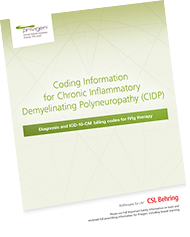Most insurers cover Privigen for the medically necessary treatment of primary immunodeficiency disease (PI), chronic inflammatory demyelinating polyneuropathy (CIDP), and chronic immune thrombocytopenic purpura (ITP). Medicaid coverage varies by state, and coverage by other payers varies by plan and by contract. Download the Prescription Referral Form to confirm insurance coverage options.
Below are the ICD-10-CM1 diagnosis codes that may be used to identify patient medical conditions typically associated with PI, CIDP, and chronic ITP.
This guide provides information from a complex and evolving medical coding system. The treating physician is solely responsible for diagnosis coding and determination of the appropriate ICD-10-CM codes that describe the patient's condition and are supported by the medical record.
All codes listed in this guide are for informational purposes and are not an exhaustive list. The CPT®, HCPCS, and ICD-10-CM codes provided are based on AMA or CMS guidelines. The billing party is solely responsible for coding of services (eg, CPT coding). Because government and other third-party payer coding requirements change periodically, please verify current coding requirements directly with the payer being billed.
Medicare coverage and billing requirements are dependent in part on where the patient is treated. CPT=Current Procedural Terminology.
*Privigen is covered by Medicare Part B for treatment in the patient's home only for these diagnoses. Other diagnoses treated in the home may be covered by Medicare Part D.
†S-codes are HCPCS codes used by some private health plans for billing and reimbursement. Medicaid plans may use S-codes as well, but Medicare does not use them.

View and download the Privigen Coding Guide
References: 1. Centers for Disease Control and Prevention. National Center for Health Statistics--ICD-10-CM. https://icd10cmtool.cdc.gov. Accessed January 22, 2025. 2. CPT Code 96365. Codify by AAPC. https://www.aapc.com/codes/cpt-codes/96365. Accessed January 22, 2025. 3. CPT code 96366. Codify by AAPC. https://www.aapc.com/codes/cpt-codes/96366. Accessed January 22, 2025. 4. HCPCS Code S9338. Codify by AAPC. https://www.aapc.com/codes/hcpcs-codes/S9338. Accessed January 22, 2025. 5. HCPCS Code J1459. Codify by AAPC. https://www.aapc.com/codes/hcpcs-codes/J1459. Accessed January 22, 2025.